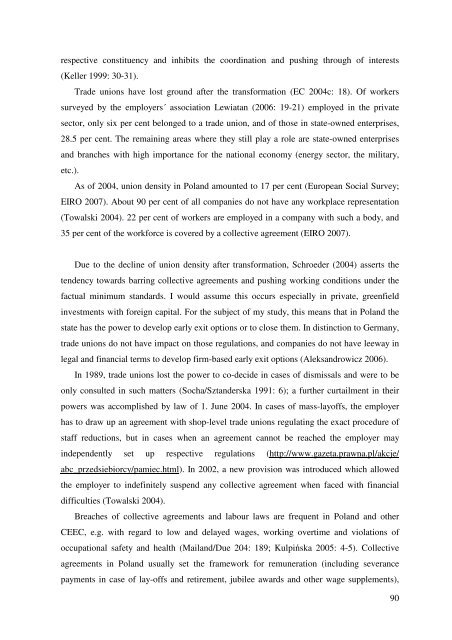Dissertation_Paula Aleksandrowicz_12 ... - Jacobs University
Dissertation_Paula Aleksandrowicz_12 ... - Jacobs University
Dissertation_Paula Aleksandrowicz_12 ... - Jacobs University
You also want an ePaper? Increase the reach of your titles
YUMPU automatically turns print PDFs into web optimized ePapers that Google loves.
espective constituency and inhibits the coordination and pushing through of interests<br />
(Keller 1999: 30-31).<br />
Trade unions have lost ground after the transformation (EC 2004c: 18). Of workers<br />
surveyed by the employers´ association Lewiatan (2006: 19-21) employed in the private<br />
sector, only six per cent belonged to a trade union, and of those in state-owned enterprises,<br />
28.5 per cent. The remaining areas where they still play a role are state-owned enterprises<br />
and branches with high importance for the national economy (energy sector, the military,<br />
etc.).<br />
As of 2004, union density in Poland amounted to 17 per cent (European Social Survey;<br />
EIRO 2007). About 90 per cent of all companies do not have any workplace representation<br />
(Towalski 2004). 22 per cent of workers are employed in a company with such a body, and<br />
35 per cent of the workforce is covered by a collective agreement (EIRO 2007).<br />
Due to the decline of union density after transformation, Schroeder (2004) asserts the<br />
tendency towards barring collective agreements and pushing working conditions under the<br />
factual minimum standards. I would assume this occurs especially in private, greenfield<br />
investments with foreign capital. For the subject of my study, this means that in Poland the<br />
state has the power to develop early exit options or to close them. In distinction to Germany,<br />
trade unions do not have impact on those regulations, and companies do not have leeway in<br />
legal and financial terms to develop firm-based early exit options (<strong>Aleksandrowicz</strong> 2006).<br />
In 1989, trade unions lost the power to co-decide in cases of dismissals and were to be<br />
only consulted in such matters (Socha/Sztanderska 1991: 6); a further curtailment in their<br />
powers was accomplished by law of 1. June 2004. In cases of mass-layoffs, the employer<br />
has to draw up an agreement with shop-level trade unions regulating the exact procedure of<br />
staff reductions, but in cases when an agreement cannot be reached the employer may<br />
independently set up respective regulations (http://www.gazeta.prawna.pl/akcje/<br />
abc_przedsiebiorcy/pamiec.html). In 2002, a new provision was introduced which allowed<br />
the employer to indefinitely suspend any collective agreement when faced with financial<br />
difficulties (Towalski 2004).<br />
Breaches of collective agreements and labour laws are frequent in Poland and other<br />
CEEC, e.g. with regard to low and delayed wages, working overtime and violations of<br />
occupational safety and health (Mailand/Due 204: 189; Kulpińska 2005: 4-5). Collective<br />
agreements in Poland usually set the framework for remuneration (including severance<br />
payments in case of lay-offs and retirement, jubilee awards and other wage supplements),<br />
90
















